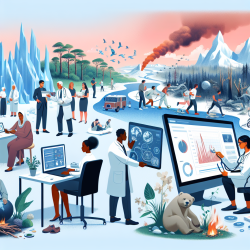Introduction
The intersection of climate change and mental health is a burgeoning area of research that holds significant implications for practitioners, especially those involved in online therapy services like TinyEYE. The scoping review titled "Climate Change and Mental Health: A Scoping Review" provides a comprehensive assessment of the existing literature, highlighting the mental health risks associated with climate change and identifying gaps that need to be addressed. This blog aims to distill key insights from the review to help practitioners enhance their skills and encourage further research in this critical area.
Key Findings
The review identifies several climate-related exposures, such as heat, humidity, rainfall, drought, wildfires, and floods, which are linked to psychological distress, worsened mental health, and increased psychiatric hospitalizations. These findings underscore the urgent need for practitioners to integrate climate-related factors into their mental health assessments and interventions.
Practical Implications for Practitioners
Practitioners can enhance their skills by incorporating the following strategies based on the review's findings:
- Risk Assessment: Regularly assess clients for climate-related stressors and their potential impact on mental health. This includes understanding how extreme weather events might exacerbate existing mental health conditions.
- Intervention Development: Develop and implement interventions that address the specific mental health impacts of climate change. This could involve creating support groups for individuals affected by climate-related events or integrating climate awareness into therapy sessions.
- Collaboration and Advocacy: Collaborate with other health professionals and community organizations to advocate for policies that address the mental health impacts of climate change. Practitioners can play a pivotal role in shaping community responses to climate-related challenges.
Encouraging Further Research
The review highlights the need for more research on effective interventions, mitigation and adaptation strategies, and decision-support mechanisms. Practitioners are encouraged to engage in research activities or collaborate with academic institutions to contribute to this growing body of knowledge. By doing so, they can help develop evidence-based practices that better address the mental health challenges posed by climate change.
Conclusion
Climate change is an undeniable reality that is increasingly impacting mental health. As practitioners, it is crucial to stay informed about the latest research and integrate these insights into practice. By doing so, we can better support our clients and contribute to the development of resilient communities. For those interested in delving deeper into this topic, the original research paper, Climate Change and Mental Health: A Scoping Review, provides a comprehensive overview of the current state of research.










